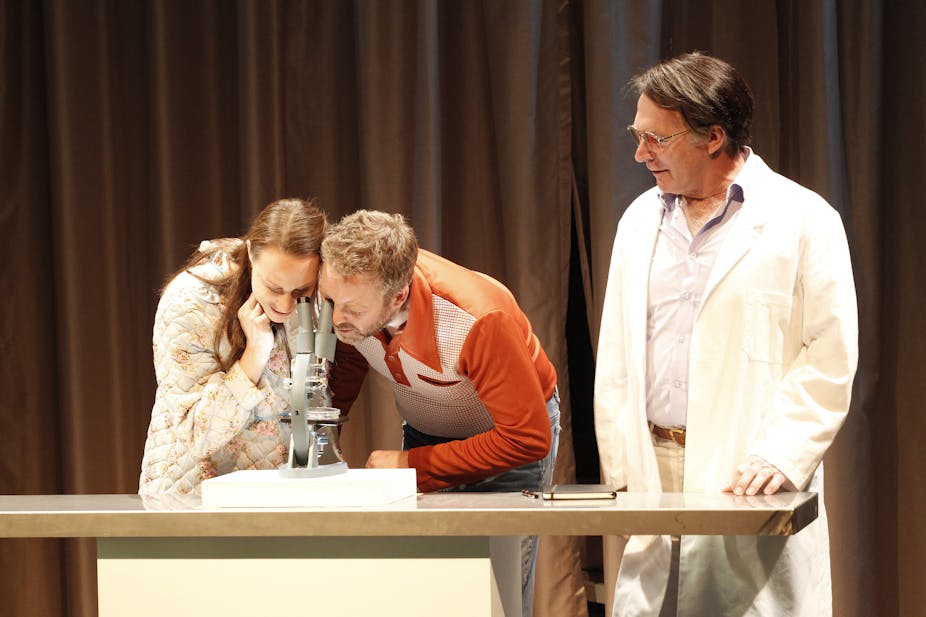Kylie Trounson is a writer and playwright – and the daughter of Melbourne IVF pioneer Alan Trounson. Her current offering, The Waiting Room, directed by Naomi Edwards showing in Melbourne, interweaves reflections on her own life and her father’s life with stories of couples desperately seeking IVF treatment.
There is something sterile about the standard definition of IVF – “a form of assisted reproduction where the eggs from a woman are extracted under anaesthetic and placed in a culture dish with thousands of sperm, allowing the process of fertilisation to take place outside the body”.
For its proponents, IVF – or invitiro-fertilisation to give it its full name – is a profound gift from science to humanity: it gives infertile couples and single parents an opportunity to have a child.
For its detractors, it represents the intrusion of technology into procreation, the most sacred area of human experience. It evokes Huxley’s nightmarish vision of children decanted in vats and the disappearance of motherhood.
These conflicting perspectives are brought to life in Kylie Trounson’s show. The play is an admirable attempt to capture the emotional and moral dimensions of IVF, and the result is rather peculiar: philosophical yet comical, polemical yet absurd.
In the midst of this there’s also significant philosophical musing – about the ethics of IVF, human participation in creation, and Frankenstein concerns about “playing God”. Trounson also engages in quite a sophisticated theatrical dialogue with the two chief opponents of IVF – feminists and the Catholic Church.
In one scene, outspoken feminist Robyn Rowland, played by Kate Atkinson, discusses her vehement opposition to Alan Trounson’s 1970s IVF programs. Roland saw Trounson’s research as manipulative, with desperate women being used as guinea pigs by self-interested male scientists. As she leaves the stage, though, a pensive Roland concedes: “It’s complicated.”
In a similar scene, now-deceased Catholic bioethicist Nicholas Tonti-Filipini, played by William McInnes, is depicted in the heat of discussion with none other than Kylie Trounson.
Tonti-Filipini was a vehement critic of IVF, but in the drama of The Waiting Room, we see a man who was empathetic to plight of infertile men and women, and who acknowledged the difficulties entailed by Catholic teaching on IVF.

The complexity of the script is perhaps a weakness.
“Dramaturgically, it bites off more than it can chew”, observed Cameron Woodhead last week in the Sydney Morning Herald. And at times didactic monologues from Kylie Trounson – who has inserted “herself” (played by Sophie Ross) as a prominent character in the script – get in the way of hilariously wacky dialogue, powerful drama and a stellar cast.
Nevertheless, I think there is a lot that can be said for Trounson’s imaginative reworking of the history of IVF in Australia. IVF was a sociological turning point in 20th century history, challenging yet not fully eliminating what were taken to be immutable limitations on human procreation.
And there is something about this sociological phenomenon that cannot be captured by clinical analysis. IVF is a drama that countless couples go through, and to differing degrees of success (the success rate for an average IVF cycle is estimated to be somewhere between 30% and 50%).
As Trounson deftly depicts, there is something absurd in the contingency of the whole process. Both couples in the play remain childless after their IVF cycles. And to tell the story otherwise, as Trounson herself states, would be disingenuous.
Trounson parodies the pristine and deceptively salubrious IVF clinics of the 21st century. A character sits down in the waiting room and is handed an iPad with the profiles of different sperm donors.
The blond-haired 39-year-old Brazilian architect is “sold out”, but the wistful 30-something folklorist is still “in stock”. Raphaelo, who has just arrived at the clinic with his partner, ridicules the affected title of the clinic: New Hope.
In the midst of all of this, the story of Alan Trouson and Carl Wood, two scientists determined to give infertile couples the opportunity to conceive, is favourably portrayed. Kylie Trounson – it seems – is by no means a foe of IVF.
Yet she clearly recognises a technological solution to childlessness is complex. IVF is not merely a scientific endeavour or a commercial enterprise. It is a deeply personal, often trying, experience. Procreating children is different from buying a new fridge.
Tonti-Filipini, charitably portaryed by Kylie Trounson, describes sex as “sacramental”. Today this idea might sound unrealistically poetic at best, stupidly naive at worst.
Yet surprisingly The Waiting Room gives unwitting witness to the sacredness of sex and questions crudely commercial approaches to the anguish of infertility.
The Waiting Room is at the Arts Centre Melbourne until June 27.

